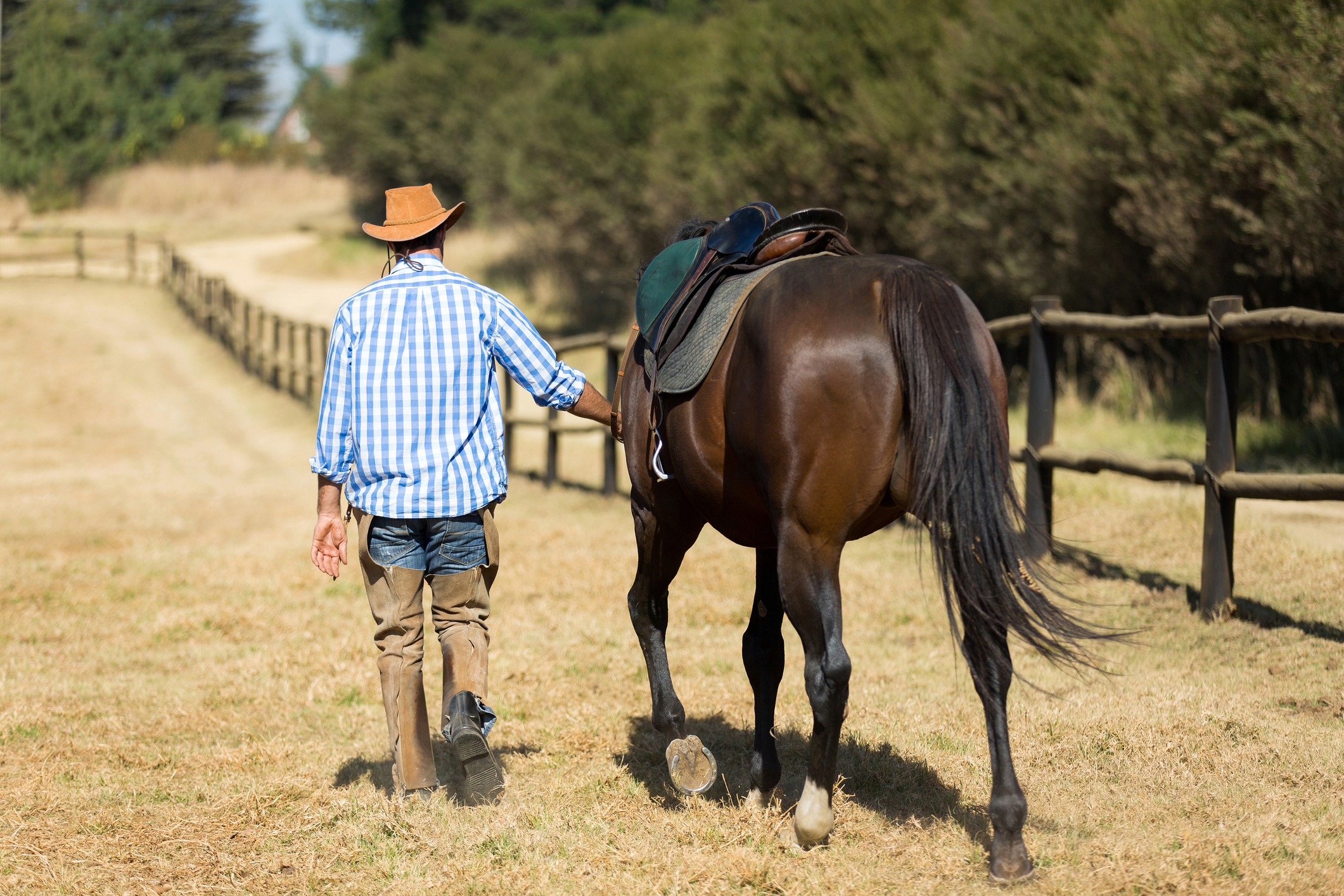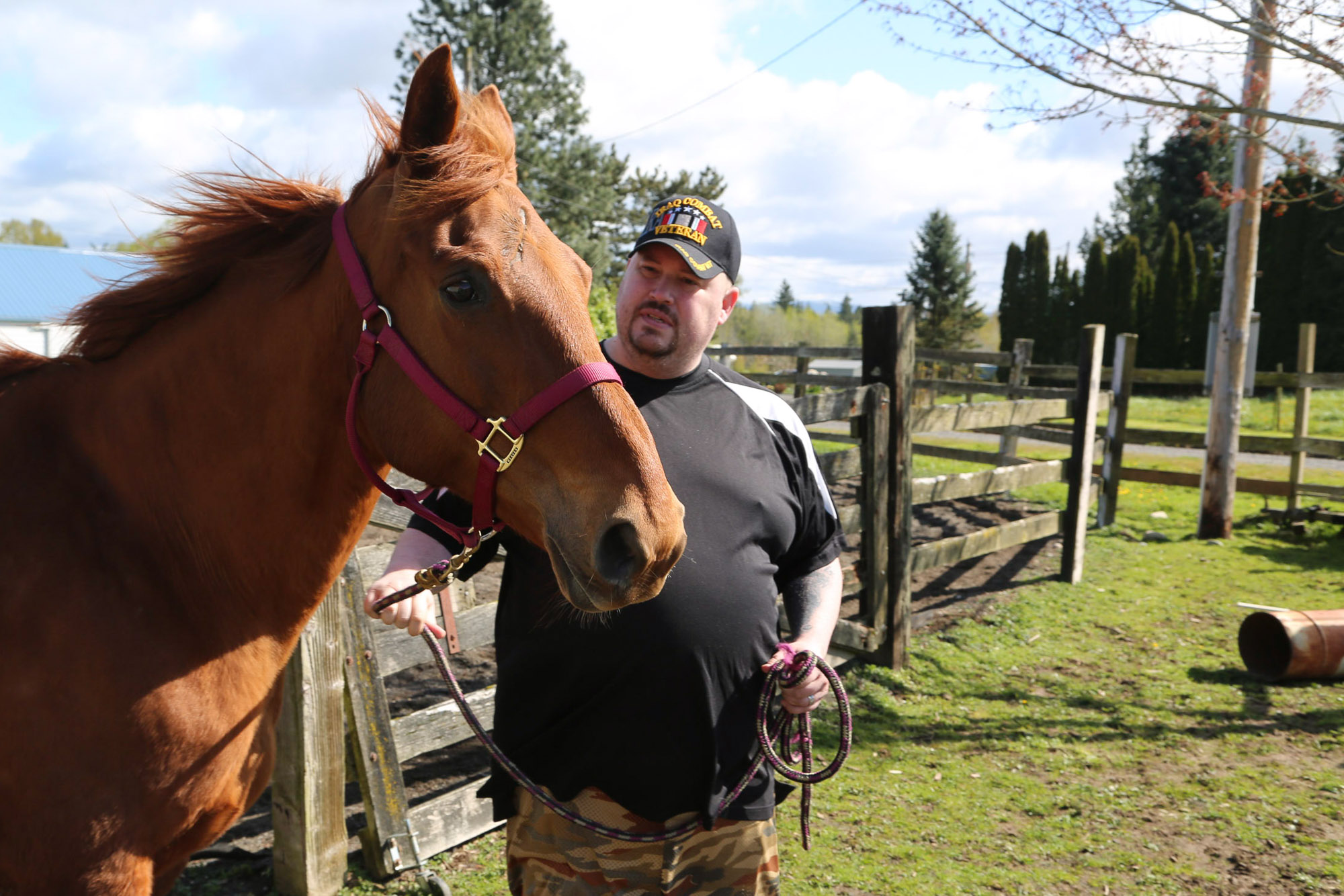How horse therapy helps treat veterans' PTSD
These gentle giants can help heal the wounds of war


A free daily email with the biggest news stories of the day – and the best features from TheWeek.com
You are now subscribed
Your newsletter sign-up was successful
Fred Krapf's upright bearing and taut diction bespeak his 32 years in the U.S. Army. If you ask him to spell his last name, he does so like this: "KILO ROMEO ALPHA PAPA FOXTROT." But his decades of experience in military intelligence throughout Germany, the Middle East, and Southeast Asia shadow him in other ways, namely profound anger and mistrust, which come out as road rage.
Now he's making peace with his past on a six-acre farm in Washington state with a horse named Sir.
Equine therapy is figuring ever larger in the Department of Veterans Affairs' quest to help the 25 percent of veterans who, like Krapf, suffer from post-traumatic stress disorder. About 30 VA medical centers across the country now offer horse therapy for service members.
The Week
Escape your echo chamber. Get the facts behind the news, plus analysis from multiple perspectives.

Sign up for The Week's Free Newsletters
From our morning news briefing to a weekly Good News Newsletter, get the best of The Week delivered directly to your inbox.
From our morning news briefing to a weekly Good News Newsletter, get the best of The Week delivered directly to your inbox.
Yuval Neria, professor of medical psychology and director of Columbia University Medical Center's PTSD Treatment and Research Program, and his colleague Prudence Fisher of Columbia University, are examining equine therapy's efficacy. Neria says about 50 percent of veterans don't even apply to be treated for PTSD. Others who do seek treatment are often not helped by current therapies and medication.
Krapf was among them. But "I was immediately, absolutely comfortable," he says of his equine-therapy experiences. "It's not the guy with the glasses and the knee over knee taking notes while someone's spilling their guts." He says with horses "people can get a better handle on things that are bothering them."
Nurse Sonja Wingard usually wears muck boots and a barn coat to work with Krapf and other veterans at Animals as Natural Therapy, a facility just north of Bellingham, Washington. She grew up on the 100-year-old farm and raised most of the 20 horses who live there. She started the veterans program seven years ago and works with assorted trained therapists.
Being married to a former serviceman gives her insight. Her husband is nearing 70 "and he still cannot sit with his back to the door in restaurants." It's almost as if he can't come off being on lifelong patrol, she explains.
A free daily email with the biggest news stories of the day – and the best features from TheWeek.com
"They always want to know who's coming and who's going" she says of vets. "They had to put emotions aside to do what they needed to do. So to get in touch with their emotions again and start to get tender with the people in their lives, they have to get tender with the horse first."
Equine therapy often focuses on seemingly simple actions, such as grooming and leading a horse around a corral. It may not involve riding at all. As Neria explains, the process emphasizes "guided interactions between the veterans and the horses in order to improve understanding of themselves and their horses."
While the sessions are low key, results can be dramatic. One morning, Krapf learned a powerful lesson from cleaning Sir's hooves. Wingard pointed out that the horse, a Tennessee walker that had been severely abused by a previous owner, had to trust him to let him handle its feet without a restraining halter. Krapf realized it was mutual: "Instant gratification — you get a lot of that with horses."

Neria and Fisher say theirs is the first attempt to provide research to back up results such as Krapf's intuitive assessment. They hope to go beyond anecdotal reports to define a specific standardized equine treatment program for people who have PTSD. While their final research results will not be released until next year, Neria and Fisher have seen "significant drops in severity of symptoms, all the symptoms of nightmares, irritability, avoidance behaviors."
Wingard says the horses model de-escalation. "The veterans see that in the horses when the horses are on alert and how they go back to what we call grazing, they go back to calm. That's what we want them to be able to do after a nightmare."
"But horses are also herd animals," Fisher adds. "They're social, so there's a lot of people learning how to recognize their own feelings. Horses reflect that, how to regulate or deal with them, how to clearly communicate."
Krapf is still tight-lipped about his "anger over command decisions that cost lives." He says he saw "ROTC lieutenants who, with no life experiences, were sent to Vietnam and put in charge of tens or hundreds of personnel, and due to their lack of experience made some very bad decisions that contributed to that tally of over 50,000 killed in action. I saw this equally as prevalent in Iraq. That tends to bother me."
Neria, himself a combat veteran and former battalion commander in the Israeli Defense Forces, was recruited by Columbia University Medical Center after 9/11 to head its PTSD program for both male and female veterans. He says relationship troubles are also common for vets. "We observe interpersonal difficulties in patients with PTSD: emotional and sexual," he says. "That's really the result of heightened levels of anxiety and depression."
But Neria and Fisher are both hopeful about horse therapy's potential to help with those issues. They say they observe that veterans gain more from traditional therapies after feeling safe enough to open up their emotions in equine therapy. "It's different in that talk therapy is about what happened to you. In equine therapy, there's no talk about the trauma," explains Fisher. "So we've had people who have finished our program and then they go to another therapy program and then are able to talk about their problem."
Working with the gentle gelding Sir at Animals as Natural Therapy has brought Krapf relief he found nowhere else. "There's just this really huge feeling of well-being" every time he finishes a session, he says. "I get goosebumps every time I even think about the energy transfer between the horses I've worked with and myself."
Sarah Eden Wallace produces freelance stories for public radio, writes about modern people transforming their lives with ancient ayurveda at Flying Elephant Source, and makes multimedia oral histories of local farmers at Blue Ribbon Stories. She was an editor at Phoenix New Times, The Arizona Republic, Phoenix Magazine, and The Bellingham Herald.
